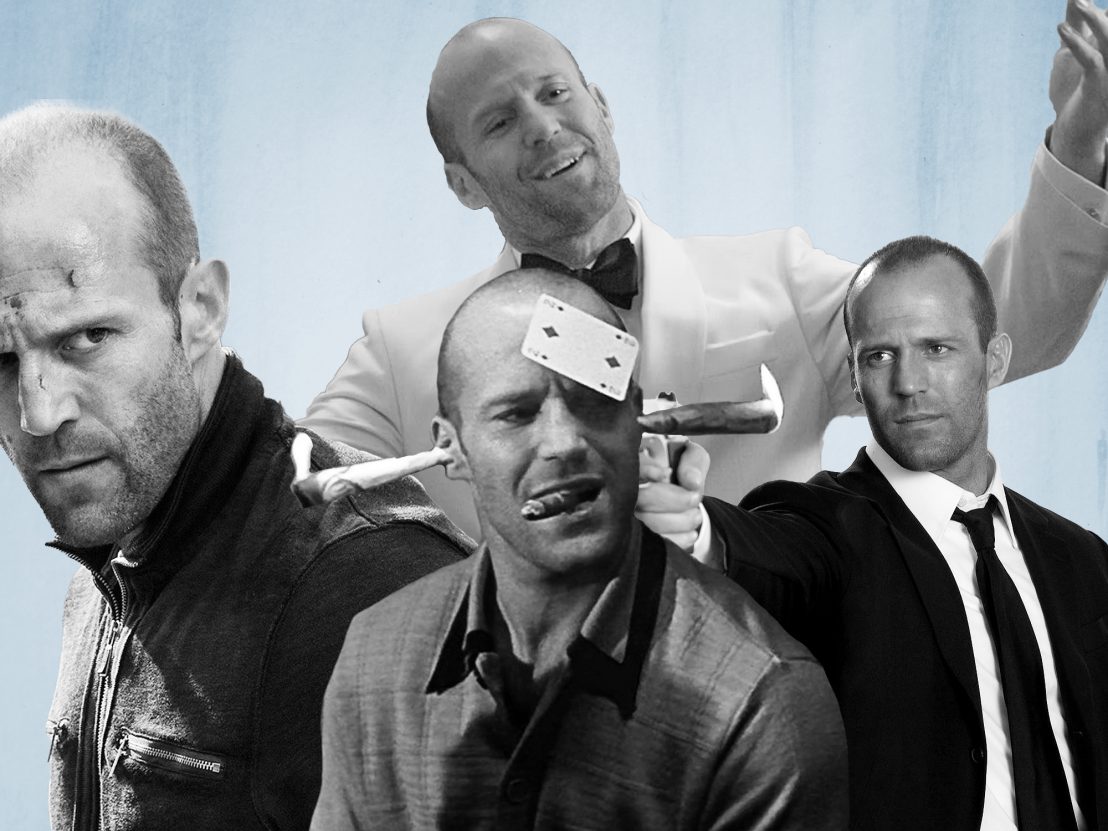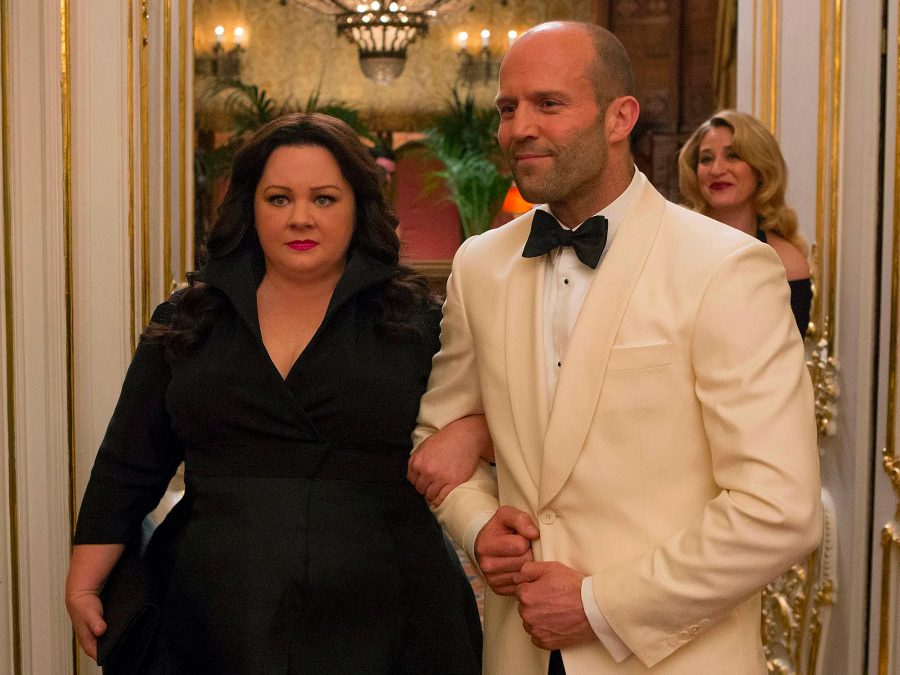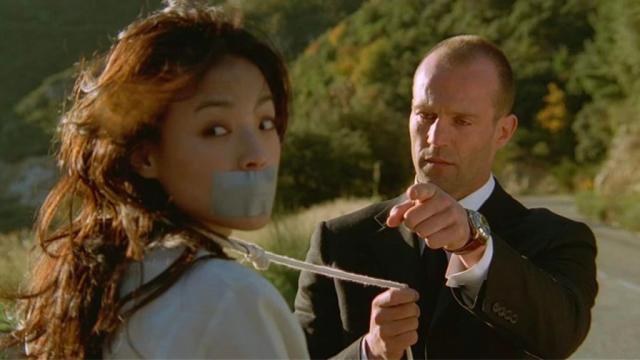Guy Ritchie’s debut feature, 1998’s Lock, Stock and Two Smoking Barrels, opens not with the former child star (Dexter Fletcher), nor with the stunt-cast footballer-turned-actor (Vinnie Jones), nor with the central protagonist of the film (Nick Moran). Instead, the first scene is given to the French Connection model with no prior acting experience, hawking stolen goods to street punters like you’d see down any disreputable London side street in the mid-90s.

This was our introduction to Jason Statham, rattling off a charmingly confident crowd-working monologue like it was second nature as small-time hustler Bacon. The cheeky glint in his eye, ruggedly handsome looks, gentle razzing of the crowd gathered, and relaxed control of the situation project an ideal of masculine coolness without being unapproachable. Even when events spiral out of control – whether it’s being presented with a gaudy cocktail or stumbling upon a bloody pile of corpses – both Bacon the character and Statham the actor have just the right disdainful quip on hand that’s almost nonchalant in its delivery.
25 years on from that first appearance, it’s fair to say that not a whole lot has changed. Jason Statham has had a lengthy acting career mostly characterised by playing slight variations on that persona. Particularly from the mid-00s to the mid-10s, a Statham vehicle was one of dependability, a 21st-century take on the kind of schlocky action B-movie which brings a comforting certainty to it.
Whilst Lock Stock… positioned him as a London geezer, it was 2002’s The Transporter directed by Corey Yuen which solidified the Statham persona for a worldwide stage: roguish ex-military/policeman working in the criminal underworld, who nonetheless has a heart of gold so long as the right insanely beautiful woman crosses his path, capable of decimating a room full of goons and driving the bejeezus out of a car in a pinch. That sentence applies to Frank Martin (the titular Transporter) but also describes to varying degrees Jensen Ames in 2008’s Death Race, Arthur Bishop in 2010’s The Mechanic, and Lee Christmas in The Expendables franchise.
These are movies which don’t ask a lot of Statham dramatically. Stoic swagger, relaxed confidence, and making even the lamest quips sound vaguely cool. Physically, they rely on his ability to convincingly pull off tight action setpieces which add to both the character and star’s mythos, a task his childhood practising martial arts made him adept at. In that first Transporter, Statham acquits himself decently with the barebones Luc Besson co-written screenplay (though he drowns in Besson’s typically awful efforts at convincing romance), but he’s made as a Movie Star in the third act when Yuen’s Hong Kong action takes over. The oil fight where Frank battles a room full of goons whilst sliding about shirtless and covered in oil is maybe the definitive Statham action scene. Impressive in its construction, equal parts cool and silly, and performed with total commitment by its star.
Even as the hits started to dry up, that archetypal Statham persona lived on. 2012’s Safe starts with Statham being atypically vulnerable, his Luke Wright giving into despair rather than resolved to vengeance once his wife is murdered by Russian mobsters. But one subway fight later, he’s back to being the cool, confident, single-minded Statham we know, playing all sides effortlessly to come out on top. 2018’s The Meg was sold off the possibility of seeing Jason Statham punch a giant shark in the face (which he indeed does). Even Ritchie succumbed to the Statham persona when the pair, 16 years after last working together on Revolver, reunited for 2021’s Wrath of Man, a convoluted crime thriller where Statham was a revenge-fuelled mob boss…playing all sides effortlessly to come out on top.

Still, it’s a persona which has served him well and made the few times where a role has played with that type all the more notable. His debut in the Fast & Furious franchise, 2015’s Furious 7, cast him in the rare villain role of Deckard Shaw; an implacable force of chaos against Dominic Toretto’s extended Family who always turns up at the worst possible moment. Later entries would lighten Shaw up, give him a redemption arc, and an invitation to the family cookout.
The starkest break from type undoubtedly comes from Paul Feig’s 2015 spoof, Spy, as CIA Agent Rick Ford. A pompous egotist whose list of cartoonish cock-ups – culminating in knocking himself out with his own coat during a dramatic finale entrance – is only eclipsed by his unbelievable boasts – including successfully impersonating Obama in Congress. Statham displays a real understanding of comedic timing, the knowledge of when to turn up his intensity to match the macho nonsense spewing from Ford’s mouth, and a selfless willingness to look a total fool that causes him to arguably steal the entire movie.
All of which were also on display in the Crank duology. Bacon introduced Statham to the world, Frank Martin defined the template for Statham going forward, but Chev Chelios may be the iconic Jason Statham role. Mark Neveldine and Brian Taylor’s gleefully offensive action-comedies play up and undermine the Statham persona at every turn. Chelios is a much-feared Los Angeles hitman capable of staving off the fast-acting poison injected into his bloodstream from instantly 𝓀𝒾𝓁𝓁ing him by sheer force of adrenaline-based will, can bring the city’s underworld to its knees within just a few hours, and survives multiple ludicrous Looney Tunes-esque deaths.
He’s also forced to utterly debase himself in order to stay alive: Chelios has 𝓈ℯ𝓍 with his girlfriend during a horserace in front of a stadium of spectators; sprints down city streets clad in only a wafting hospital gown; attaches a shock collar to his neck and barks like a dog, and clamps his nipples to a car battery. Crank and its sequel Crank: High Voltage overload on so much testosterone that they manage to simultaneously function as both cool, brainless macho action movies and absurdist parodies of brainless macho action movies.
This is largely because Statham brings the same commitment he would to a more straight-laced role. He’s naturally charming, which keeps Chelios entertaining despite the many awful things the man does in both movies. He’s confident and assertive, which makes the many implausible feats Chelios pulls off fully believable, and the times when he gets rattled even funnier. Statham can sell absurd lines with a nonchalance that’s entertaining and egoless, embracing the questionable quality of whatever script he’s performing.
Across his quarter-century career, Statham has come in for criticism about his limited range and role choices. But there’s a certain dependability you get from a Jason Statham role, and he possesses a refreshing understanding of his capabilities as an actor. These qualities make those instances where a role of his unexpectedly deviates all the more exciting.






